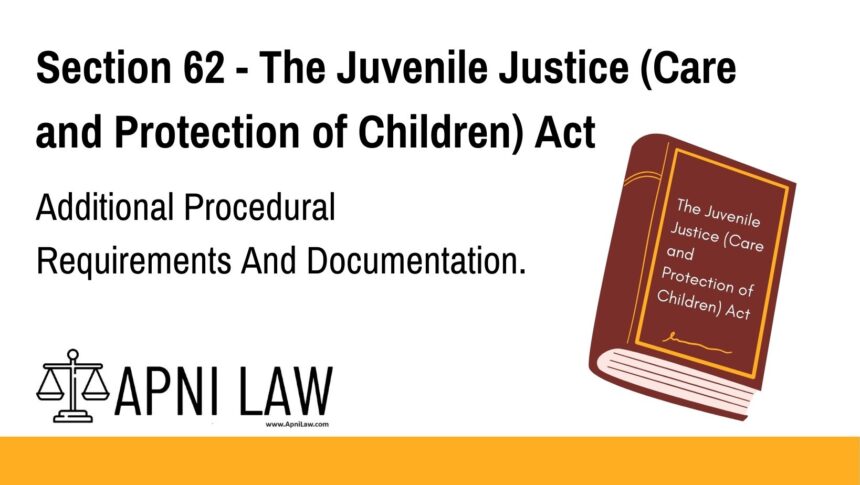Code: Section 62 JJ Act
(1) The documentation and other procedural requirements, not expressly provided in this Act with regard to the adoption of an orphan, abandoned and surrendered child by Indian prospective adoptive parents living in India, or by non-resident Indian or overseas citizen of India or person of Indian origin or foreigner prospective adoptive parents, shall be as per the adoption regulations framed by the Authority.
(2) The specialised adoption agency shall ensure that the adoption case of prospective adoptive parents is disposed of within four months from the date of receipt of application and the authorised foreign adoption agency, Authority and State Agency shall track the progress of the adoption case and intervene wherever necessary, so as to ensure that the time line is adhered to.
Explanation of Section 62 JJ Act
Section 62 of the Juvenile Justice Act outlines extra steps that apply to certain adoption cases. These steps come into play when specific situations are not directly covered by the Act.
For example, when Indian residents or foreign nationals apply to adopt an orphan, abandoned, or surrendered child, the law defers to the regulations set by the Central Adoption Resource Authority (CARA). These detailed rules ensure that the process is consistent, fair, and legally compliant.
Additionally, the law requires that the adoption agency handle each case within four months. During this time, the foreign adoption agency, the State Agency, and CARA must monitor the case. If they see delays, they must step in to resolve them.
This section improves accountability and speeds up the adoption process. It also protects children from unnecessary delays.
Illustration
Example 1: Adoption by NRI Parents
An NRI couple submits an application to adopt a child in India. The application is handled by a specialised adoption agency. Since some details are not mentioned in the JJ Act, the agency follows CARA’s adoption guidelines. The couple receives a decision on their application within four months.
Example 2: Agency Misses Deadline
A foreign couple’s adoption application is delayed due to missing documents. CARA notices the delay. It works with the agency to get the case back on track and completed within the allowed time.
Common Questions and Answers on Section 62 JJ Act
- Who sets the rules for adoption if the Act doesn’t cover certain details?
CARA creates the rules through its adoption regulations. - Which adoptive parents are covered under this section?
This section applies to Indian citizens, NRIs, OCIs, PIOs, and foreigners who want to adopt in India. - How long should it take to process an adoption case?
Adoption agencies must complete each case within four months of receiving the application. - Who ensures the timeline is followed?
The adoption agency, CARA, State Agency, and foreign adoption agency (if involved) monitor the case. - What if the process is delayed?
These agencies must step in to fix any delay and ensure the four-month deadline is met.
Conclusion
Section 62 of the Juvenile Justice Act ensures that adoption processes are clear, fair, and timely—especially in complex cases involving foreign or non-resident Indian adoptive parents. By relying on CARA’s regulations and enforcing strict deadlines, this section helps children find safe homes without unnecessary delay.
To learn more about adoption laws and procedures in India, visit ApniLaw.








